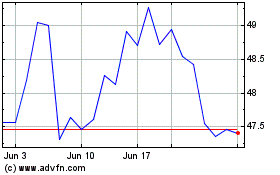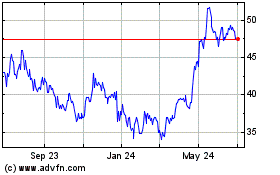By Shan Li
This article is being republished as part of our daily
reproduction of WSJ.com articles that also appeared in the U.S.
print edition of The Wall Street Journal (March 8, 2019).
BEIJING -- Facebook Inc.'s latest shift toward private
messaging, payments and e-commerce echoes the footsteps of WeChat,
China's social networking super app that many Chinese find
indispensable.
After Facebook Chief Executive Mark Zuckerberg said in a blog
post that the social media powerhouse that encourages public
sharing sees its future in encrypted messaging, payments and other
services, the similarities were striking to many Chinese.
"Isn't this just WeChat?" one user noted on Weibo, China's
answer to Twitter.
The path to a super-app wouldn't be as smooth for Facebook as it
was for WeChat, which was sheltered from competition in a market
hungry for its services, and doesn't provide the level of privacy
that many users of a Facebook app would likely demand.
But for wired Chinese -- and tech-sector analysts -- the reason
for Facebook's shift is easy to understand. Developed by Tencent
Holdings Ltd. WeChat has evolved from a simple messaging service
into an app where users can shop, pay, order food, buy movie
tickets and make restaurant reservations and doctor's appointments
without leaving the platform.
WeChat counts over one billion users. Tencent doesn't break out
financial figures specifically for WeChat and gaming remains its
biggest source of revenues. In its last financial quarter, the
company recorded year-over-year revenue growth of over 60% in
social advertising, payment services and other businesses related
to WeChat.
It has helped turn the Shenzhen-based company into one of
China's biggest, most influential companies, with investments in
industries including retail, health care, transportation and
education.
Facebook is "very aware of how Tencent has been able to
integrate messaging and payment and e-commerce and all of these
mini-apps into one platform," said Ben Cavender, a senior analyst
at China Market Research Group.
Facebook executives have spoken admiringly of WeChat. David
Marcus, Facebook's former head of Messenger, has called out apps
developed in Asia, including WeChat, as trailblazers in offering
services on messaging platforms. Tencent didn't respond to a
request for comment about Facebook's strategy shift.
By pushing into services, Facebook is trying to find other ways
of making money beyond advertising, which accounts for about 98% of
its revenue.
"They are looking at future growth," said Mr. Cavender, "seeing
that this is one option that has clearly worked."
A huge draw of WeChat is its mobile payment system, WeChat Pay,
which enables users to pay both virtually and in physical stores
without cash or credit cards by simply scanning a QR code. People
can also transfer money to each other through the app.
Its popularity has drawn a huge variety of businesses, many of
which rely on WeChat for the bulk of their customers, according to
analysts. Chinese startups such as Pinduoduo Inc., an e-commerce
company that offers group discounts on consumer goods, have
piggybacked off the social network's popularity to achieve unicorn
status.
Tencent "has moved into markets like retail and education and
health care -- and payments is their foot in the door in all of
these industries," said Matthew Brennan, a China tech consultant
and writer. "When you have embedded digital payments into your
system, you can build out and offer other services."
Unlike Facebook, which is promising encrypted messaging,
WeChat's messages aren't securely encrypted, and the service is
seen by cybersecurity analysts as unsafe. Tencent denies that and
says it protects users' privacy.
Tencent is also required by law to keep information on users and
to police content for material the government deems
objectionable.
If Facebook aims to develop a super-app on par with WeChat, it
will face a tougher road.
WeChat grew up within the protective confines of China, where
the government has sheltered its homegrown champions by warding off
foreign rivals, sometimes by blocking them outright. Facebook,
Messenger, WhatsApp and Instagram, for example, are all
inaccessible in China without a virtual private network, or
VPN.
People in China were also open to adopting mobile payments.
Chinese banks are notoriously known for poor customer service,
while credit cards never caught on in a big way. And Tencent's
aggressive string of acquisitions means it owns a stake in many of
the businesses that offer services through WeChat, such as
lifestyle platform Meituan Dianping and e-commerce giant
JD.com.
Facebook, on the other hand, will have to ink deals with
individual businesses to offer services via its platforms. It may
also need to convince Americans and others attached to their credit
cards to try paying with their smartphones instead.
Its past experiments into digital payments has had mixed
success. Messenger offers a payment function where users can send
money to contacts, but it has lagged behind rivals such as Venmo or
Apple Pay, analysts said.
"Tencent is working in its home market," said Mr. Brennan, the
consultant. "It's just a messier picture compared to rolling out
something like payments to a global audience."
--Xiao Xiao contributed to this article.
Write to Shan Li at shan.li@wsj.com
(END) Dow Jones Newswires
March 08, 2019 02:47 ET (07:47 GMT)
Copyright (c) 2019 Dow Jones & Company, Inc.
Tencent (PK) (USOTC:TCEHY)
Historical Stock Chart
From Mar 2024 to Apr 2024

Tencent (PK) (USOTC:TCEHY)
Historical Stock Chart
From Apr 2023 to Apr 2024
